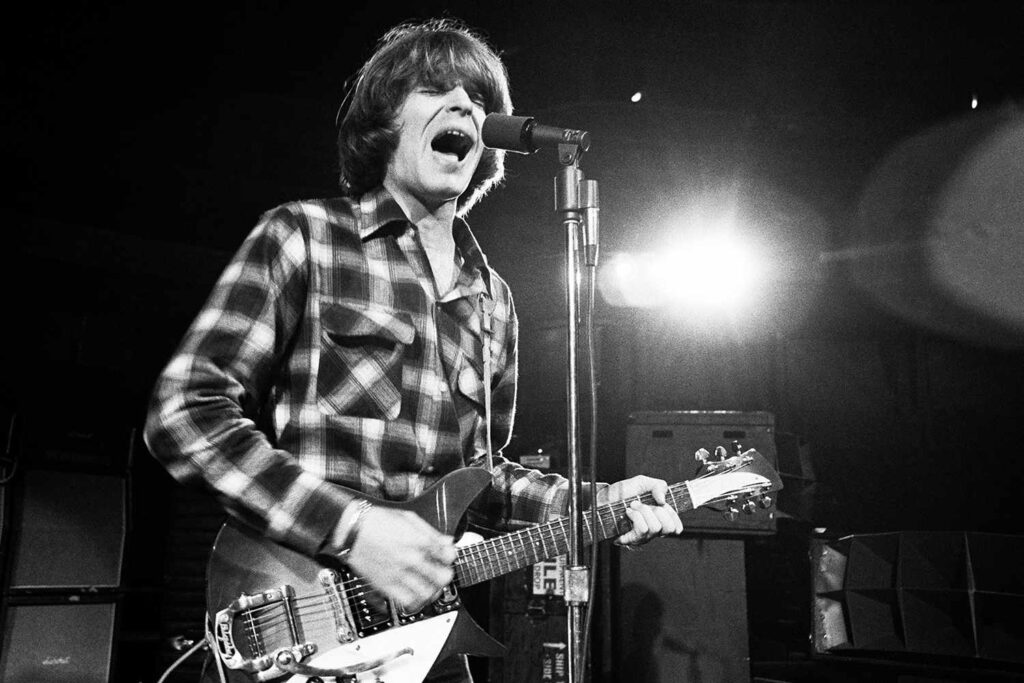NEED TO KNOW
The return of the instrument set him on a path toward forgiveness, from decades of lawsuits to reconciling his feelings about his late brother Tom
With Legacy, Fogerty re-records Creedence classics alongside his sons, turning old wounds into a celebration of family and music
For Christmas 2016, John Fogerty received a special gift from his wife, Julie: his long-lost 1969 Rickenbacker guitar. The instrument had accompanied him during the glory years of Creedence Clearwater Revival, when he used it to play self-penned classics like “Proud Mary,” “Fortunate Son” and “Have You Ever Seen the Rain” on stages around the world — including a legendary appearance at Woodstock.
Between 1969 and 1971, the group was one of the hottest acts in America, scoring an astonishing 14 Top 10 singles and five Top 10 albums in just two years. Their songs became the soundtrack to a turbulent era, echoing through war zones, protest rallies, juke joints and jukeboxes across the country. But when CCR splintered amid bitter legal and personal battles at the dawn of the ’70s, Fogerty gave away the guitar, a symbol of both his past and his pain. Seeing it under the Christmas tree 43 years later, he burst into tears. “But they were happy tears,” he tells PEOPLE. “I was crying like a kid.”
David McClister
Despite Creedence’s enormous global success, tensions began to simmer as the other members grew resentful of Fogerty’s outsized role in their achievements. In 1971, his brother Tom — the group’s rhythm guitarist — departed on unhappy terms. (The brothers remained estranged when Tom died of AIDS, contracted through a blood transfusion, in 1990.) The remaining trio carried on briefly before disbanding for good a year later. They would never perform together again.
As Fogerty embarked on a solo career, he quickly found himself hamstrung by a strict contract with CCR’s label, Fantasy Records, owned by executive Saul Zaentz. The deal bound him to the company for years and gave Fantasy control over his publishing rights, meaning Fogerty no longer owned the very songs he had written. Disputes over royalties and creative control escalated into a flurry of lawsuits with Zaentz that would take decades to resolve.
For much of this period, Fogerty refused to play his own hits live, distancing himself from the painful memories they carried — and from the Rickenbacker he had once used to create them.
Mike Coppola/MJF2015/Getty
Before the Christmas morning reunion, Fogerty had encountered the instrument only once, not long after his marriage to Julie in 1991. The couple had been browsing a vintage guitar shop in Southern California when the owner surprised him by bringing out the Ric. For Fogerty, the sight was not a happy one. “I was hurt and bothered by seeing that guitar. I mean, there was so much pain [in it], you know. Those emotions were still active. Which is why I gave it away. So I didn’t want any part of it.”
His mood worsened when the proprietor offered to sell it to him — for $40,000. “I’m sure a few expletives flew,” he admits. “You know, ‘I shouldn’t have to pay for my own guitar! That’s my guitar!’ So I rejected the whole thing.”
Over the next several years, Fogerty began to process the wounds left by CCR’s collapse. He credits Julie as a crucial force in that renewal. “Some sort of evolution had happened. It’s a testament to our relationship. She had healed me and I was now ready to be receptive.” Once Fogerty started openly musing about wanting his old instrument back, Julie secretly went to work tracking it down. “Then she put it under the Christmas tree. So much has started to open up and flow since then.”
The gift marked the beginning of a joyful reckoning with his history — and Julie played a central role in that healing. Acting as her husband’s manager, she engineered another life-changing surprise: a deal that allowed Fogerty to purchase the CCR catalog. For the first time in his life, he owned the rights to the very songs that helped define the rock ’n’ roll canon.
That victory led to Legacy, a new album that finds Fogerty literally remaking his past from a place of love. Working from his home studio with sons Shane, 33, and Tyler, 32, Fogerty revisited his Creedence-era catalog using his beloved Rickenbacker.
Tim Mosenfelder/WireImage
More than a musical catharsis, the project became a chance for Fogerty to share his legacy directly with his sons. “When we started this record, it was at my son Shane’s insistence,” he says. “He played some guitar licks, and it was wonderful to teach him how they went. When we hear the new recording on TV or the radio, I turn to Shane and go, ‘How’s it feel to hear yourself on the radio, man?’ It’s dad passing on the musical baton. It feels great.”
Now 80, Fogerty jokingly compares the project to Taylor Swift’s “Taylor’s Version” re-recordings — note-for-note remakes born of hard-fought artistic battles.
“Despite the joy I felt being with Julie and my family, there was always that shadow of the past,” he explains. “There were so many unpleasant memories connected to those songs, but doing this project and having my family involved was such a nice alternative to the way I had remembered it. It was almost like an antidote! Re-inflating the memories with so much love soothed my soul.”
Legacy is available now.

